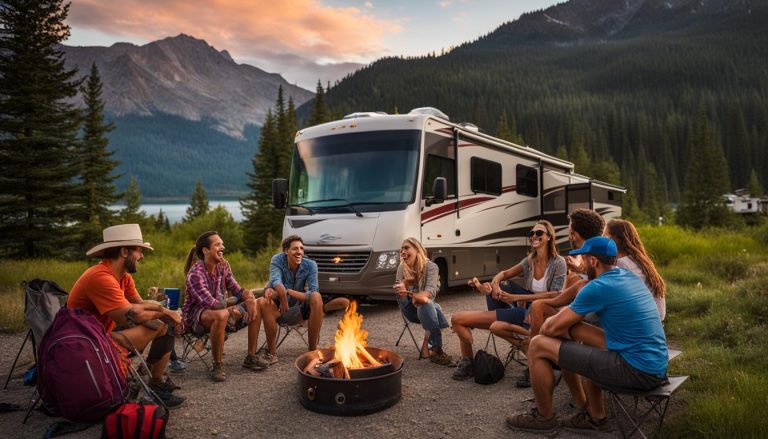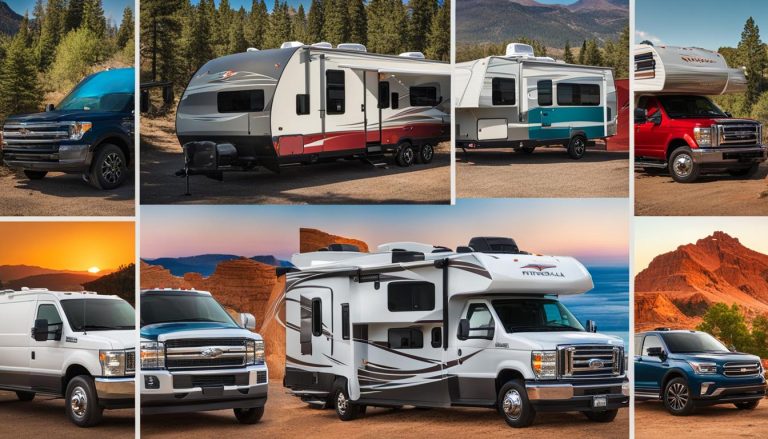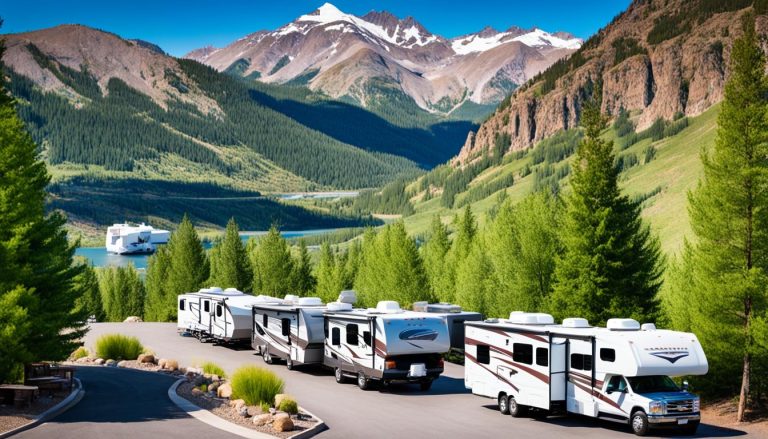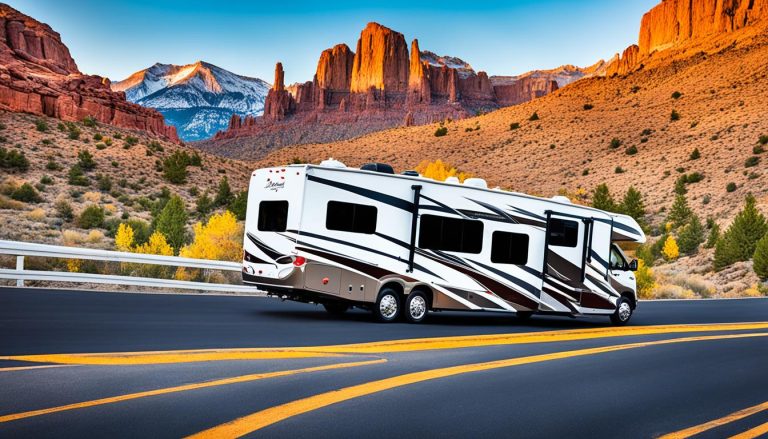RV Rental Policies & Agreements Explained
gorvlifestyle.com and its partners may earn a commission if you purchase a product through one of our links
Navigating the dynamic world of RV rentals requires a solid understanding of RV rental policies and agreements. These documents are essential for both RV owners and the adventurers who rent from them, serving as a blueprint that dictates motorhome rental guidelines, camper rental agreements, and RV rental rules and regulations. A well-crafted agreement provides both parties with clear expectations and responsibilities to ensure a smooth rental experience.
Whether you’re planning a cross-country trip or a weekend getaway, knowing these policies creates a foundation of trust and understanding. The detailed contracts not only outline what’s expected during the rental period, but also play a critical role in safeguarding both the renter’s and owner’s interests, reducing risks and enhancing the joy of the journey.
Key Takeaways
- Rental agreements are crucial for defining the terms of RV usage and responsibilities of all parties involved.
- Understanding the rental policies helps ensure compliance with the law and smooth operation during the rental period.
- Agreements typically include specifications such as rental duration, authorized drivers, and insurance details.
- Motorhome rental guidelines within these contracts protect both the vehicle’s condition and the safety of the occupants.
- Reviewing and negotiating rental contracts with legal assistance can prevent misunderstandings and potential disputes.
- Being familiar with the camper rental agreements can aid in handling charges, fees, and cancellation policies effectively.
- Ignoring RV rental rules and regulations can lead to extra costs and legal issues, making knowledge of these policies imperative.
Understanding the RV Rental Agreement Basics
Initiating an adventure on the open road with a rented RV involves more than just picking up the keys; it requires a solid legal foundation. At the core of this transaction are the rental terms and conditions for RVs, which provide a framework for expectations and responsibilities during the rental period.
Defining an RV Rental Agreement
An RV rental agreement is a legally binding document that outlines the specifics of renting a recreational vehicle. These specifics often include the RV lease terms, encompassing rental duration, payment stipulations, and guidelines for use. The rental agreement serves as a comprehensive guide, outlining RV rental contract details to safeguard both the renter and the RV owner.
The Purpose of Structured Rental Agreements
The well-defined structure of an RV rental agreement is pivotal in ensuring a smooth and conflict-free rental experience. A definitive RV rental agreement template addresses all foreseeable situations, from the handling of mechanical issues to stipulations for late returns or cancellations. By clearly laying out the conditions, these documents minimize misunderstandings and provide a quick reference for dispute resolution.
The Role of Lawyers in Crafting Rental Agreements
When it comes to constructing a robust RV rental contract, legal expertise is indispensable. Attorneys who specialize in the field understand the nuances of contractual law as it pertains to RV rentals. They are instrumental in drafting agreements that not only address the basic rental terms and conditions for RVs but also safeguards related to insurance, state laws, and renter’s rights. Their role ensures that both parties’ interests are legally protected.
Essential Components of RV Rental Contracts
When it comes to setting out on the open road, understanding the various elements of RV rental policies and agreements is as critical as planning the journey itself. These contracts serve as a roadmap for the rights and responsibilities of the renter and the owner and help to navigate the intricacies of motorhome rental guidelines. Here we explore the key components that make for a sturdy and reliable rental agreement.
Identification of Parties and Rental Duration
At the core of any RV rental contract is the clear identification of the two main parties involved: the RV owner and the renter. This section will detail the personal information of both parties and will establish the foundation of trust necessary for a successful rental transaction. Additionally, the contract will specify the rental duration, commonly referred to as the ‘Rental Period’, outlining the start and end dates of the rental agreement. Together, these details ensure that there is no confusion over who is renting the RV and how long they are entitled to use it.
Determining the Authorized Drivers
The issue of who is allowed to drive the RV under the rental agreement is another significant aspect typically addressed in the contract details. To ensure a level of safety and responsibility, the agreement will unequivocally specify the requirements that an ‘Authorized Driver’ must meet. Commonly, authorized drivers are expected to be at least twenty-five (25) years of age and hold a valid driver’s license. Below, a table outlines the critical components that form the backbone of RV rental contracts.
| Contract Component | Description | Importance |
|---|---|---|
| Identification of Parties | Full legal names and contact information of the owner and renter. | Establishes the legal entities entering into the agreement. |
| Rental Duration | Specific start and end dates for the rental period. | Defines the temporal scope of the rental and aids in scheduling and pricing. |
| Authorized Drivers | Criteria and information regarding who is permitted to operate the RV. | Ensures legal and insurance compliance; promotes responsible use. |
Understanding these crucial facets of RV rental contract details can make the difference between a smooth rental experience and potential legal complications. Both renters and owners are encouraged to familiarize themselves with these components to uphold the motorhome rental guidelines and ensure a memorable adventure on the open road.
Insurance and Protection Terms in RV Rentals
Embarking on an RV adventure brings the inevitable question of how to safeguard your journey against unforeseen events. This is where RV rental insurance and protection plans step in, providing renters with peace of mind throughout their travels. From optional insurance to mandatory coverage, the terms outlined in the campervan rental policies are crafted to ensure both renter and owner are suitably protected.
Navigating these insurance options can be overwhelming; hence, understanding the various types of coverage is crucial. Let’s delve into the specifics that could be included in your rental agreement:
- Liability Insurance: Covers damages to third parties in the event of an accident.
- Collision Insurance: Addresses damages to the RV resulting from collisions.
- Comprehensive Insurance: Offers protection against a range of risks, including theft, fire, and other non-collision damages.
Rental companies like RVshare have instituted comprehensive insurance and protection plans. Below is a table that breaks down the coverages and options you might encounter:
| Coverage Type | Description | Deductible |
|---|---|---|
| Liability Insurance | Protection against claims arising from injuries or damage to other people or property. | Varies by state |
| Physical Damage | Covers the RV in the event of collision or other damages. | $1,500 (USD) |
| Comprehensive | Protection from theft, fire, vandalism, and other unforeseen events. | $1,500 (USD) |
| Optional Add-ons | Additional coverages such as roadside assistance, personal item protection, and trip cancellation. | Varies based on the plan |
Before signing the dotted line on your RV rental agreement, ensure you understand the terms, conditions, and the extent of the coverage provided. Knowing what is covered, the limits of protection, and your responsibilities can significantly influence your rental experience. Always remember to inquire about optional insurance and protection plans that provide additional security and comfort on your road trip.
Navigating the Charges and Fees Structure
Understanding the financial commitments involved in RV rentals is not only necessary to manage one’s budget but also to adhere to RV rental rules and regulations. As you embark on securing a recreational vehicle for your next adventure, discerning the fee structure is just as important as familiarizing yourself with the rental unit itself.
Understanding Rental Period Charges
At the outset, during the rental period, renters are required to pay a base rental fee. This fee is generally straightforward and serves as the foundation upon which other costs may build, depending on extra services or amenities required by the renter. It’s imperative that individuals renting motorhomes are clear on what the basic rental fee covers to avoid any unforeseen expenses.
Calculating Additional Fees
Added fees can often catch renters off guard—these may include costs for optional accessories, additional mileage, or generator use. Adhering to the campervan rental policies outlined in your agreement is crucial to avoid incurring these surprise charges. It’s wise to inquire about any potential extra fees that could be applicable to your unique travel needs or circumstances.
Moreover, the management of security deposits is a noteworthy component of RV rental policies and agreements. This deposit ensures coverage for any damages or policy breaches that may occur, safeguarding both the renter and the rental company. Always clarify the terms regarding the return of your security deposit, underlining what conditions must be met for a full refund.
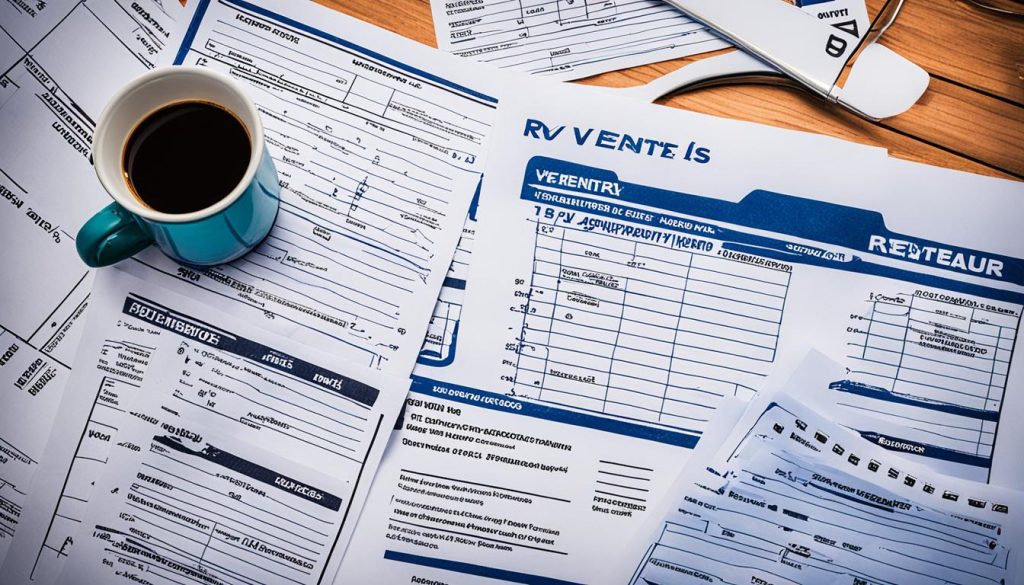
Whether you choose to traverse the countryside with a fleet of RVs or a modest campervan, understanding these financial intricacies is paramount. By preparing for both the expected and unexpected fees, travelers can ensure a seamless and enjoyable journey in their rental—free from the stress of last-minute financial surprises.
Compliance with State and Federal RV Rental Laws
For those looking to hit the open road and explore the beauty of America, renting an RV is a popular option. However, it is essential for renters and RV rental companies alike to adhere to state and federal laws concerning RV rentals. State and federal laws for RV rentals serve as a foundation for rental terms and conditions for RVs, outlining the legal parameters within which renters must operate to ensure a compliant and hassle-free journey.
Understanding the intricate RV rental contract details can make a difference between a memorable trip and a complicated legal tangle. Regulations might vary across states, but standard legal requirements include age minimums and proper licensing for renters. Most states require RV operators to be at least 25 years old with a full driver’s license. Companies may also impose additional restrictions to comply with insurance policies.
The key to a successful RV rental experience is to remain well-informed about the legal implications and to diligently uphold the laws that govern RV rentals across state lines and federal jurisdictions.
With the aim of ensuring every traveller is well-equipped with knowledge, below is an outline of crucial legislative areas every renter should consider:
- Age Requirements and Licensing: Renters must meet the minimum age requirement and hold a valid driver’s license as per state law.
- Insurance Coverage: Renters should understand the insurance provisions outlined in the rental agreement that must be consistent with federal regulations.
- Safety Standards: The RV should comply with all safety standards and regulations, which include but are not limited to, vehicle size, weight, and emissions.
- Rental Agreement Compliance: The rental agreement should reflect all state-mandated terms, ensuring both parties’ responsibilities are clear and lawful.
Balancing the fun of an adventurous road trip with the serious nature of legal adherence ensures a seamless rental process. Such diligence with state and federal RV rental laws not only protects the renters but also maintains the integrity of the vibrant RV rental industry.
RV Rental Insurance: A Comprehensive Guide
Embarking on an RV adventure can offer unparalleled freedom and flexibility, but it is crucial for renters to understand RV rental insurance to ensure their trip is as carefree as the open road. Insurance and protection in RV rentals differ substantially from standard vehicle insurance and are designed to address the unique needs of a motorhome experience.

While there is a myriad of options for motorhome rental guidelines, they all share the common goal of providing a safety net for both the renter and the RV owner.
Optional Insurance and Protection Plans
Many RV rental companies offer a range of optional insurance and protection plans to cater to different levels of risk tolerance and budget. These plans often extend beyond the basic liability coverage that is legally required, adding layers of protection against potential unforeseen events.
- Collision Damage Waivers (CDW) relieve renters of financial responsibility for damage to the RV, provided the renter adheres to the terms of the rental agreement.
- Roadside Assistance plans provide help during mechanical failures, ensuring that renters have support available in case of an emergency.
- Personal Effects Coverage is for renters who wish to insure personal belongings carried in the RV against loss or theft.
- Supplemental Liability Insurance (SLI) increases the renter’s liability coverage above the statutory minimum, a prudent choice for added peace of mind.
What RV Rental Insurance Typically Covers
Understanding the scope of coverage is pivotal when it comes to RV rental insurance. While specifics can vary based on provider, policy, and state regulations, here’s what rental insurance generally covers:
| Coverage Type | Inclusions | Typical Cost |
|---|---|---|
| Basic Liability Coverage | Property damage and bodily injury to third parties | Mandated by state law |
| Comprehensive & Collision | Physical damage due to collision, theft, vandalism, or other covered scenarios | $15 – $30 per day |
| Uninsured Motorist | Damage caused by drivers lacking adequate insurance coverage | Varies by provider |
| Roadside Assistance | Towing, tire changes, battery service, and lockout assistance | Additional fee or included in some plans |
Expectations regarding RV rental insurance should align with the value of the motorhome and the specific terms of the rental contract. Whether traversing country roads or parking in serene landscapes, securing proper insurance and protection in RV rentals is the traveler’s compass to a worry-free journey.
Understanding Liability and Damage Policies
Embarking on the open road with an RV rental brings a sense of freedom and adventure. Nevertheless, understanding the liability and damage coverage stipulated within RV rental policies and agreements ensures that this freedom isn’t overshadowed by the unexpected. RV rental insurance is an integral part of these policies, offering renters peace of mind as they navigate new landscapes.
Clarifying Tenant and Owner Responsibilities
Owning an RV or renting it out requires a thorough grasp of the responsibilities associated with liability and damage. Both parties—tenant and owner—need to be clear on their obligations to avoid discrepancies should an incident occur. RV rental agreements are designed to precisely outline the scope of liability and the extent of damage coverage, ensuring that each knows what to expect and how to proceed in the event of an accident or damage.
Coverage for Collision and Bodily Harm
In the world of RV rentals, adequate coverage for collision and bodily harm is non-negotiable. While liability and damage coverage in RV rentals typically cover these areas, renters should prioritize understanding their policy’s specifics. State minimums may not suffice, particularly with RVs, which can be intricate and expensive to repair. Moreover, securing coverage beyond the RV itself—to include personal belongings and potential injuries—is a matter of safety and financial prudence.
Ultimately, the goal is to ensure a journey that is as smooth as possible, protected against the unforeseen with the proper insurance and agreements in place. It’s not just about sheltering oneself from liability; it’s about preserving the joy of the journey, assuring that a bump in the road doesn’t result in a lasting burden.
Rental Agreement Cancellation Policies
When planning an RV adventure, understanding the cancellation policies for camper rentals is as essential as the thrill of the journey itself. A solid grasp of RV rental agreement terms and RV rental contract details can prevent financial surprises and cultivate confidence in your travel planning.
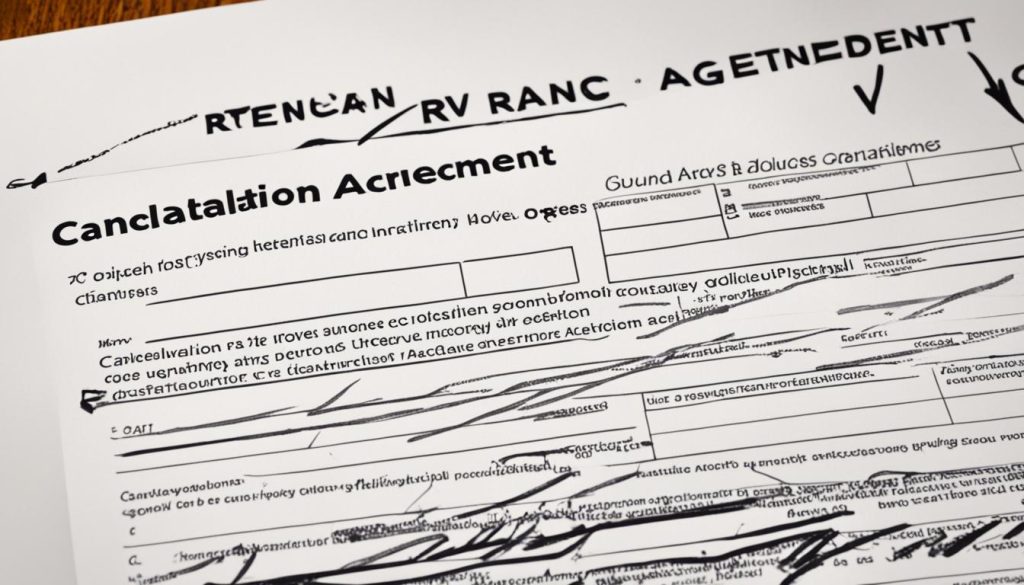
Conditions for Cancelling RV Rentals
To navigate the landscape of RV rentals, one must be acutely aware of the conditions that permit cancellation. Most reputable RV rental companies, such as RVshare, outline specific situations where renters may cancel their booking without a hefty financial impact. Common conditions include unforeseen life events, natural disasters, or a simple change of plans. However, cancellation is rarely free of consequence beyond designated grace periods, precisely why diligent renters must familiarize themselves with the terms set forth in their rental contracts.
Understanding Refund Amounts and Fees
Understanding the intricacies of refund amounts and associated fees is crucial to making informed decisions about your rental. Cancellation policies typically feature a tiered refund system where the timing of the cancellation dictates the refund percentage. To illustrate, let’s consider the various outcomes:
| Timing of Cancellation | Refund Amount | Cancellation Fee |
|---|---|---|
| More than 30 days before rental | Full refund | $0 |
| 14-30 days before rental | 50% refund | 50% of total rental cost |
| Less than 14 days before rental | No refund | 100% of total rental cost |
Armed with this knowledge, renters can make decisions that align with their risk tolerance and financial comfort. Transparency in cancellation policies for camper rentals establishes a trust-based relationship between the rental company and the customer, ensuring all parties are on the same page.
Motorhome Rental Guidelines: Rules and Regulations
Embarking on a motorhome adventure requires an understanding of the crucial rules and guidelines that govern campervan rentals. For a journey that is both enjoyable and compliant with legal standards, renters must familiarize themselves with the specific campervan rental policies, RV rental rules and regulations, and motorhome rental guidelines. Ensuring adherence to these policies not only protects the renter and the RV but also enhances the overall rental experience.
Adhering to Campervan Rental Policies
Abiding by rental company policies is a cornerstone of responsible motorhome usage. These policies typically encompass rules about where the RV can be driven, the number of people it can accommodate, and restrictions on activities such as smoking or pet accommodation. Renters should diligently review these policies to avoid any misunderstandings or potential breaches of contract terms.
Ensuring the Safety and Maintenance Standards are Met
Renters shoulder a significant responsibility when it comes to the safety and maintenance of the rented vehicle. A thorough walk-through of the RV, guided by a checklist, often precedes the handover process. This is critical to ensure that the renter is aware of how to operate all the features of the RV safely and maintain them properly throughout the duration of the rental period.
To further illustrate the importance of understanding and adhering to rental guidelines, below is a comprehensive table summarizing the key areas of focus:
| Key Focus Area | Description | Examples |
|---|---|---|
| Authorized Driving | Limits operation to listed drivers in agreement | Must have a valid driver’s license and meet age requirements |
| Destination Restrictions | May prohibit travel to certain areas or roads | Off-road driving typically not allowed |
| Maintenance Requirements | Renter’s responsibilities for daily upkeep | Checking tire pressure, fluid levels, and battery charge |
| Equipment Usage | Proper use of RV features and appliances | Instructions for operating slide-outs, generators, and heating systems |
| Safety Protocols | Standards for safe driving and vehicle handling | Compliance with speed limits, seat belt use, and avoiding driver fatigue |
It is clear that by thoroughly understanding and adhering to the outlined campervan rental policies, RV rental rules and regulations, and motorhome rental guidelines, renters can ensure that their travel experience is not only compliant with industry standards but also secure, responsible, and ultimately more satisfying.
RV Lease Terms: Duration and Mileage Limitations
When venturing into the world of RV rentals, understanding the RV lease terms, specifically the duration of the lease and mileage limitations, is crucial. These rental agreements come with predefined conditions that must be thoroughly reviewed to prevent unexpected expenses and logistical hurdles. The length of the rental period and the maximum allowed mileage are clearly articulated within the contract, offering a guideline for how far and how long renters can enjoy their motorhome experience.
Adhering to motorhome rental guidelines doesn’t just safeguard renters from additional fees; it also ensures a fluid, enjoyable journey without last-minute complications. By acknowledging your lease’s duration and mileage restrictions, you pave the way for a smoother rental experience. Renters must pay close attention to these details, as exceeding the mileage cap can notably increase the total cost of the rental, impacting both budget and travel plans.
It is the attention to RV rental contract details like these that can make or break a road trip adventure. Renters should approach lease terms with diligence and clarity, asking questions if any part of the agreement remains unclear to them. This careful consideration is not just about staying within contractual boundaries; it’s about crafting a memorable experience free from the stress of breaching lease terms.



